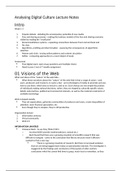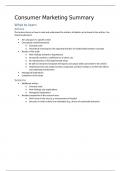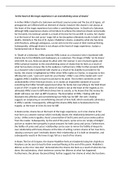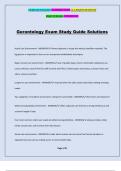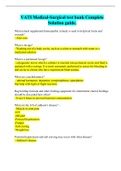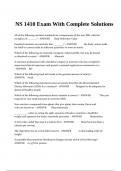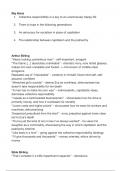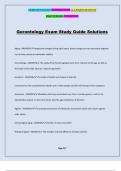Analysing Digital Culture Lecture Notes
Intro
Week 1-3
1. Popular debate - debating the emancipatory potential of new media
2. Free and sharing economy - making the business models of the free and sharing economy
visible by reading the "small print"
3. Recommendations systems - unpacking connections between front end and back end
4. No class
5. Algorithms, profiling and discrimination - assessing the consequences of algorithmic
selection
6. Memes and virals - tracing online patterns and content circulation
7. Selfies - comparing approaches to a novel object of study
Assessment
Final digital exam: open essay questions and multiple choice
Need to pass 5 out of 7 weekly assignment
01 Visions of the Web
What narratives of the "nature" of the web hide…
What these narratives about the "nature" of the web hide is that a range of actors - web
users, producers and investors, to name a few - are technologies of media to promote and use,
how to use them, which ones to invest in, and so on. Such choices are not simply the product
of individuals making rational decisions; rather, they are shaped by culturally specific values,
beliefs and practices, political and commercial interests, as well as the material constraints of
available technology
Web is shaped socially
They set expectations, galvanize communities of producers and users, create inequalities of
attention, steer financial speculation, etc.
Even though they're utopian, they're still productive
Organization lecture
1. Information universe
2. Virtual community
3. Web 2.0
INFORMATION UNIVERSE
Vannevar Bush - As we May Think (1945)
o Involved 6000 scientist (mathematicians, natural etc.)
o Bush found that there was a growing mountain of scientific research that was
difficult to navigate - came to the conclusion that library structure wasn't efficient -
wanted to find a new way
"there is a growing mountain of research. But there is increased evidence
that we are being bogged down today as specialization extends. The investigator is
staggered by the findings and conclusions of thousands of other workers -
conclusions which he cannot find time to grasp, much less to remember, as they
, appear. Yet progress and the effort to bridge between disciplines is
correspondingly superficial.
o Came up with "Memex"
Machine that will organize papers and information - be able to navigate
them
Cor e idea: these different documents could be associated together by
linking them - making connections
o Selection
Data placed in storage are filed alphabetically or numerically - information is
found by tracing it down from subclass to subclass. One has to have rules as to
which path will locate it, and the rules are cumbersome.
The human mind does not work that way
o Associative indexing - the memex
Consider a future device for individual use, which is a sort of mechanized
private file and library. It needs a name and to coin one at random, "memex" will
do.
It affords an immediate step however, to associative indexing, the basic idea
of which is a provision whereby any item may be caused at will to select
immediately and automatically another
A proto-hypertext system
The process of tying two items together
Ted Nelson - Hypertext (1963)
o Hypertext editing system
o Hypertext is a body of written or pictorial material interconnected in such a complex
way that it could not conveniently be presented or represented on paper
o Project Xanadu (1960) - the first hypertext project (similar to the world wide web)
If a document was removed, the link would be removed
A system where copyright would be respected
Douglas Engelbart - NLS (1962) (worked with Nelson)
o Worked on a system parallel to Nelsons research
Tim Berners-Lee's proposal for the World Wide Web in Match 1989
o His vision for the web
Suppose each of these documents has the same property of being linked to
other original documents all over the world
VIRTUAL COMMUNITY
Ken and Kesey and The Merry Pranksters
Stewart Brand
o Was influenced by The Merry Pranksters
o Influenced by the native Americans which he viewed as authentic - still attached to
their culture and background ?
, Chris Anderson (editor Wired) on chain of influence
o "The Whole Earth Catalogue inspired the Homebrew Computing Club, who inspired
Steve Wozniak to build the Apple 2, who inspired the personal computer movement,
who in turn inspired the original web. Who inspired the open-source software
movement which inspired the maker movement who inspired me."
The Well
o Launched in 1985
o Created and build with the idea of translating communities to the internet, realizing
these ideals online
o Howard Rheingold - The Virtual Community
One of the first people who were enthusiastic about this
About sharing, collaboration, expressing yourself and doing things yourself -
through technology
o Cozy little world
Finding the WELL was like discovering a cozy little world that had been
flourishing without me, hidden within the walls of my house; an entire cast of
characters welcomed me to the troupe with great merriment as soon as I found
the secret door. Like others whole fell into the WELL, I soon discovered that I was
audience, performer, and scriptwriter, along with my companions, in an ongoing
improvisation.
o Grounded in physical world
The WELL felt like an authentic community to me from the start because it
was grounded in my everyday physical world. WELLites who don't live within
driving distance of San Francisco Bay area are constrained in their ability to
participate in the local networks of face to face…
o What they do
Exchange pleasantries and argue, engage in intellectual discourse, conduct
commerce, exchange knowledge, share emotional support, make plans,
brainstorm, gossip, feud, fall in love, find friends and lose them, play games, flirt…
WEB 2.0
o Refers to websites that emphasize user-generated content, ease of use, participatory
culture and interoperability (i.e., compatible with other products, systems, and devices)
for end users.
o Tim O'Reilly
Presented Web 2.0 as a completely new phase in the development of the web
Its about participating, sharing, collaborative knowledge development
o Clay Shirky
Has a ted talk - recommended to watch it (2008)
Intro
Week 1-3
1. Popular debate - debating the emancipatory potential of new media
2. Free and sharing economy - making the business models of the free and sharing economy
visible by reading the "small print"
3. Recommendations systems - unpacking connections between front end and back end
4. No class
5. Algorithms, profiling and discrimination - assessing the consequences of algorithmic
selection
6. Memes and virals - tracing online patterns and content circulation
7. Selfies - comparing approaches to a novel object of study
Assessment
Final digital exam: open essay questions and multiple choice
Need to pass 5 out of 7 weekly assignment
01 Visions of the Web
What narratives of the "nature" of the web hide…
What these narratives about the "nature" of the web hide is that a range of actors - web
users, producers and investors, to name a few - are technologies of media to promote and use,
how to use them, which ones to invest in, and so on. Such choices are not simply the product
of individuals making rational decisions; rather, they are shaped by culturally specific values,
beliefs and practices, political and commercial interests, as well as the material constraints of
available technology
Web is shaped socially
They set expectations, galvanize communities of producers and users, create inequalities of
attention, steer financial speculation, etc.
Even though they're utopian, they're still productive
Organization lecture
1. Information universe
2. Virtual community
3. Web 2.0
INFORMATION UNIVERSE
Vannevar Bush - As we May Think (1945)
o Involved 6000 scientist (mathematicians, natural etc.)
o Bush found that there was a growing mountain of scientific research that was
difficult to navigate - came to the conclusion that library structure wasn't efficient -
wanted to find a new way
"there is a growing mountain of research. But there is increased evidence
that we are being bogged down today as specialization extends. The investigator is
staggered by the findings and conclusions of thousands of other workers -
conclusions which he cannot find time to grasp, much less to remember, as they
, appear. Yet progress and the effort to bridge between disciplines is
correspondingly superficial.
o Came up with "Memex"
Machine that will organize papers and information - be able to navigate
them
Cor e idea: these different documents could be associated together by
linking them - making connections
o Selection
Data placed in storage are filed alphabetically or numerically - information is
found by tracing it down from subclass to subclass. One has to have rules as to
which path will locate it, and the rules are cumbersome.
The human mind does not work that way
o Associative indexing - the memex
Consider a future device for individual use, which is a sort of mechanized
private file and library. It needs a name and to coin one at random, "memex" will
do.
It affords an immediate step however, to associative indexing, the basic idea
of which is a provision whereby any item may be caused at will to select
immediately and automatically another
A proto-hypertext system
The process of tying two items together
Ted Nelson - Hypertext (1963)
o Hypertext editing system
o Hypertext is a body of written or pictorial material interconnected in such a complex
way that it could not conveniently be presented or represented on paper
o Project Xanadu (1960) - the first hypertext project (similar to the world wide web)
If a document was removed, the link would be removed
A system where copyright would be respected
Douglas Engelbart - NLS (1962) (worked with Nelson)
o Worked on a system parallel to Nelsons research
Tim Berners-Lee's proposal for the World Wide Web in Match 1989
o His vision for the web
Suppose each of these documents has the same property of being linked to
other original documents all over the world
VIRTUAL COMMUNITY
Ken and Kesey and The Merry Pranksters
Stewart Brand
o Was influenced by The Merry Pranksters
o Influenced by the native Americans which he viewed as authentic - still attached to
their culture and background ?
, Chris Anderson (editor Wired) on chain of influence
o "The Whole Earth Catalogue inspired the Homebrew Computing Club, who inspired
Steve Wozniak to build the Apple 2, who inspired the personal computer movement,
who in turn inspired the original web. Who inspired the open-source software
movement which inspired the maker movement who inspired me."
The Well
o Launched in 1985
o Created and build with the idea of translating communities to the internet, realizing
these ideals online
o Howard Rheingold - The Virtual Community
One of the first people who were enthusiastic about this
About sharing, collaboration, expressing yourself and doing things yourself -
through technology
o Cozy little world
Finding the WELL was like discovering a cozy little world that had been
flourishing without me, hidden within the walls of my house; an entire cast of
characters welcomed me to the troupe with great merriment as soon as I found
the secret door. Like others whole fell into the WELL, I soon discovered that I was
audience, performer, and scriptwriter, along with my companions, in an ongoing
improvisation.
o Grounded in physical world
The WELL felt like an authentic community to me from the start because it
was grounded in my everyday physical world. WELLites who don't live within
driving distance of San Francisco Bay area are constrained in their ability to
participate in the local networks of face to face…
o What they do
Exchange pleasantries and argue, engage in intellectual discourse, conduct
commerce, exchange knowledge, share emotional support, make plans,
brainstorm, gossip, feud, fall in love, find friends and lose them, play games, flirt…
WEB 2.0
o Refers to websites that emphasize user-generated content, ease of use, participatory
culture and interoperability (i.e., compatible with other products, systems, and devices)
for end users.
o Tim O'Reilly
Presented Web 2.0 as a completely new phase in the development of the web
Its about participating, sharing, collaborative knowledge development
o Clay Shirky
Has a ted talk - recommended to watch it (2008)


